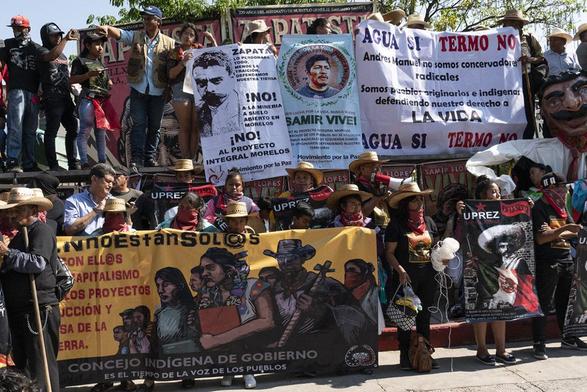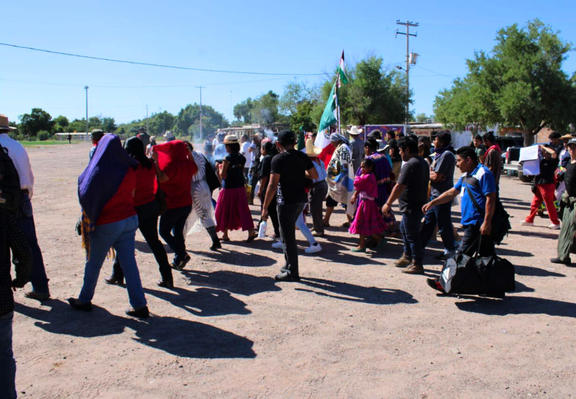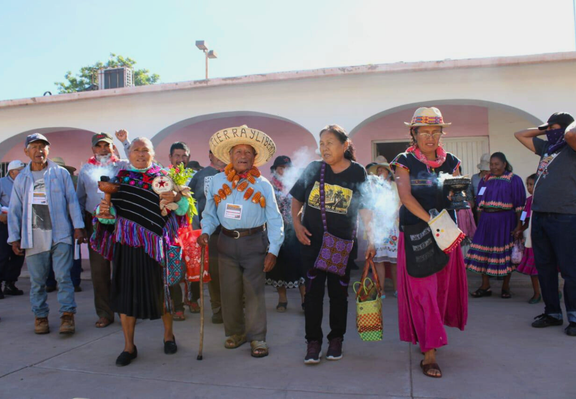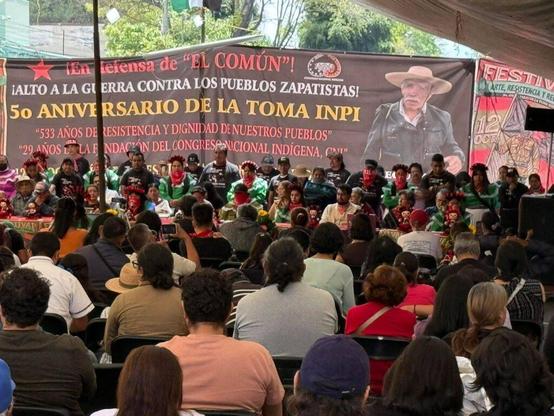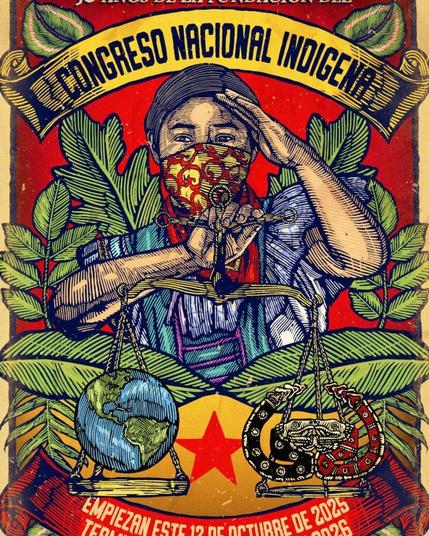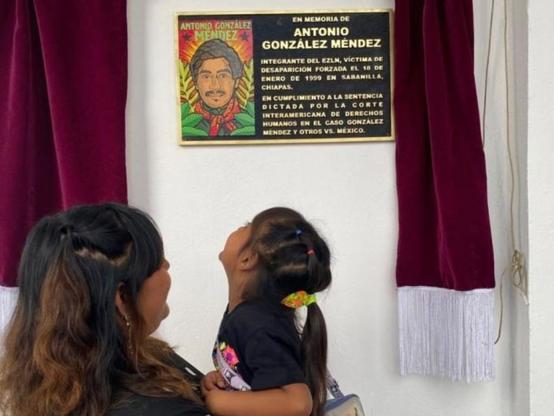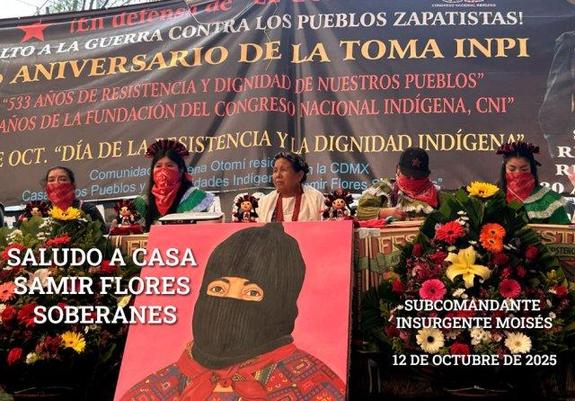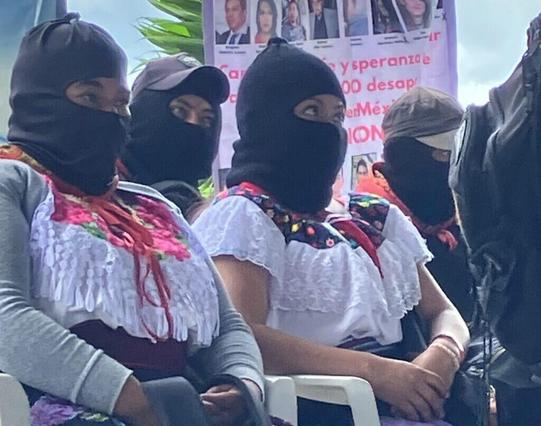To Those Who Are Not Indifferent to War — Zapatistas
An open letter from organizations, collectives, networks, and public figures from Mexico and other countries demand an “end to all forms of direct and indirect harassment against the community of Belén and all Zapatista localities.”
#ZapatistasUnderAttack
To those who are not indifferent to war:
In the midst of the war against humanity that commodifies everything, the exercise of the Zapatista common is as hopeful as it is uncomfortable. There is nothing more dangerous to the owners of capitalist and colonial power than the commons that the Zapatistas are building in their territory.
Dispossession, exploitation, contempt, and repression are the daily food of the violent hydra. Against this, day by day, pathways of autonomy are being built in the dignified and rebellious Zapatista communities, which not only continue to exist despite the imposition from above of a curtain that has sought to erase them from the Mexican landscape, but are growing, strengthening, reorganizing, and continuing (as always) to inspire.
The denunciation published by the Assembly of Zapatista Autonomous Government Collectives (https://wp.me/p9YUg-6Fj) on September 28 regarding the systematic harassment carried out through inter-institutional operations (Federal Army, Ocosingo Municipal Police,Chiapas State Attorney General’s Office) against the Zapatista village of Belén in Caracol 8 “Dolores Hidalgo” over land intended for communal work between Zapatistas and non-Zapatista is an example of the urgency with which municipal, state, and federal governments seek to stifle the growth of the idea that land can belong to those who work it in common. In addition to the fact that these lands have already been paid for, as the Gobiernos en Común (Governments in Common) point out in their denunciation: “… it is clear that this is a plan by the three levels of bad governments because it has already been paid for and why is the land now being handed over again? What the fourth transformation is seeking here is conflict, confrontation, and war.”
They prefer to generate confrontations between communities and maintain the power that comes with managing that violence, rather than allowing a process of deep and concrete autonomy to grow, in which Zapatista and non-Zapatista communities find ways to coexist and build their present and future without ceding their decision-making power to caciques, rulers, or businessmen.
It seems that President Claudia Sheinbaum prefers that the land belong to caciques and murderers and that the “good and wise” people continue to be satisfied with the crumbs of welfare.
In August of this year, at the meeting “Resistance and Rebellion: Some Parts of the Whole,” the EZLN showed, without pretense or rhetoric, a process of profound self-criticism and the radical reorganization that this implied in its ways of organizing, governing, and building its process of autonomy. It was also a space where those of us who dream of a world after the storm came together, in person or from a distance, to feel the beat of our dignified and rebellious hearts beating stronger with the inspiration and example of the Zapatistas.
It was a moment when hope found sustenance. Today, the state government of Eduardo Ramírez Aguilar in Chiapas and the federal government of Claudia Sheinbaum are fueling violence and cruelty in what appears to be a strategy to provoke the EZLN in order to justify a massacre and an attempt to intensify the war, even though they are trying to hide it.
We, the undersigned, urge and demand an end to all forms of harassment, direct and indirect, against the community of Belén and all Zapatista communities.
The presence of the Armed Forces, state and municipal police, and the prosecutor’s office is clear evidence of who is responsible. It only remains to say that any damage caused in this context will only increase and intensify the repudiation of a government that presents itself as different but replicates the same cruelty and contempt. The Zapatista struggle goes beyond fads, borders, official narratives, and rhetoric. We are watching, from inside and outside Mexico, and we want to say to our Zapatista compañerxs:
We are here!
Signed:
Organizations in México:
Espacio de Coordinación Nacional Alto a la Guerra Contra los Pueblos Zapatistas
Asamblea Nacional por el Agua y la Vida
Centro de Derechos Humanos Fray Bartolomé de Las Casas
Nodo de Derechos Humanos (NODHO)
Raíces en resistencia
Colectivo de apoyo al CNI-CIG, EZLN, Llegó la Hora de los Pueblos
Cátedra Jorge Alonso
Red de feminismos descoloniales
Red de Resistencias y Rebeldias AJMAQ
Pueblos Unidos de la Región Cholulteca y de los Volcanes
El Tekpatl periódico crítico y de combate
El periódico la Flor In Xóchitl in Cuícatl
Grupo Tlali Nantli
Concejo Autónomo Santiago Mexquititlán, Amealco Querétaro
Mazatecas por la Libertad
Espacio de Lucha contra el olvido y la represión
Antsetik Ts’unun.
Movimiento de mujeres en defensa de la Madre Tierra y nuestros territorios
Red Universitaria Anticapitalista
Comunidad Indígena Nahua Milpa Alta CNI
Consejo de Bienes Comunales Indígena Nahua Tlacotenco
Guardia Comunal Tlacotenco
Guardia Comunal Tona
Escuela Comunal Casa del Arte Tlaixco
ILANCUEITL danza de las Tlacualeras
Centro de Derechos Humanos de la Montaña Tlachinollan
Colectivo “Voz de los Desaparecidos en Puebla”
Fanzinoteka Guerra Idealista
Colectivo de Resistencia Estudiantil 10 de junio (CRE)
Tlapaltik b’e cooperativa
Geo-grafías Comunitarias
Resistencias Enlazando Dignidad-Movimiento y Corazón Zapatista (RedmycZ)
Mujeres y la Sexta – Abya Yala
Brigada Callejera
UPADI
COT
Casa obrera de Tlaxcala
HIJ#S DEL MAIZ PINTO
Mexicanos Unidos
Organización popular Francisco Villa de izquierda independiente
Vendaval Cooperativa panadera y algo más
Comunidad de Tlanezi Calli en Resistencia
Comunidad de XOCHITLANEZI del Común
RAIS (Red de Apoyo Iztapalapa Sexta)
Asociación de Exploración Científica Cultural y Recreativa “Brújula Roja”
Concejo Indígena y Popular de Guerrero Emiliano Zapata (CIPOG-EZ)
Zapateando, medios libres
Red de Resistencia y Rebeldía Tlalpan
Grupo de Trabajo No Estamos Todxs
Red Morelense de apoyo al CIN y CIG
Colectiva mi Alegre Rebeldía
Resonancias Radio
MAIZ
Colectivo de Profes en la Sexta
Colectivo de Trabajo los Cafetos
Colectivo Cuaderno Común
Colectivo de Abogadxs la Otra Justicia
Colectivo Gavilanas
Colectivo la Grieta Panadera
Colectivo caminando al horizonte en común
Colectivo Criptopozol DDHH
Mujeres transformando Mundos
Colectiva Miradas críticas del territorio desde el feminismo
Centro de Investigación en Comunicación Comunitaria A.C.
Colectivx Zapatista La Oveja Roja
Resistrenzas-Puebla
PueblaxPalestina
Red de Resistencia y Rebeldía del Puerto de Veracruz,en apoyo al C.I.G. C.N.I.
La Juventud Comunista de México
Partido de los Comunistas
EzcuelitaGDL
Brigada Dr. Ignacio Martín-Baró
Materia Oscura
Colectivo Casa Click
Colectiva Mujeres Tejiendo Resistencia
El Frente Feminista de Jalisco
Glorieta de las mujeres que luchan
Mujeres y Disidencias de la Sexta en la Otra Europa y Abya Yala
Tejiendo Luchas desde México
Universidad de la Tierra en Puebla (UnitierraPuebla)
El Taller, Centro de Sensibilización y Educación Humana A.C
Cybersivxs Hacklab SCLC
Anar.Coop Tecnologías de la Liberación
Mexicali Resiste
Colectivo Mujeres Tierra
Colectivo Noche de los Mayas
Tianguis Alternativo de Puebla
DASAC (Desarrollo y Aptendizaje Solidario, A.C)
Empalabrando, colectivo de la palabra viva, San Juan del Rio Qro.
Comité de acompañamiento, Escolásticas Pedro Escobedo Querétaro.
Comida no bombas, Querétaro
Colectivo Conciencia y Libertad
La Red de Resistencia y Disidencia Sexual y de Género
Cooperativa Tecuani Kakaw
Nodo Solidario (México)
Comida No Bombas Qro
No-escuela Caracol
Caracteres no existentes
Pindorama
Red REIR
Festivales solidarios
Laboratorio Popular de Medios Libres y Noticias de abajo
Asamblea General Permanente de San Gregorio Atlapulco
Sexta por la Libre Yucatán
Mínima Galería Íntima (Narraturgias de la memoria)
CIE El Teatrito Yucatán
Casa de Sanación: Na´ Ch´ul Chan
Tejiendo Organización Revolucionaria
International Organizations:
Batec Zapatista Barcelona
Asamblea Libertaria Autoorganizada Paliacate Zapatista, Grecia
Colectivo Armadillo Suomi/Finlandia
Assemblea de Solidaritat amb Mèxic del País Valencià
El Grupo de Chiapas, LAG Noruega
Centro de Documentación sobre Zapatismo – CEDOZ
Y Retiemble, Madrid
Lumaltik Herriak, País Vasco
Pallasos en Rebeldía
Feministas Red Alforja
Cal cases, catalunya
La Red de Rebelión Alemania
Confederación General del Trabajo
Unión Sindical Solidaires de Francia
Museo de Formas Imposibles – MIF, Finlandia
Anticapitalistas
CSPCL, París, Francia
Seminario de Marxismo y Feminismo en América Latina
Abya Yala rompe el cerco
Chiapas Support Committee – Oakland, CA
Red Sexta Grietas del Norte, Estados Unidos
Gruppe BASTA Munster, Alemania
Red Ya Basta, Alemania
Colectivo gata-gata. Alemania
Cafè Rebeldía-Infoespai, Barcelona-Catalunya
Colectivo Ramona de Chipre
Escuelas para Chiapas / Schools for Chiapas
Comités Locales de Emergencia y Reconstrucción
Acord Social Valencià
Koordinadore de Kolectivos del Parke Alcosa
Solidariedade às comunidades zapatistas – Rio de Janeiro
Vocesenlucha – Comunicación Popular
Colectivo Zapatita de Lugano, Suiza
SOA il Molino, Lugano, Suiza
20zln -Italia
Individuals from México and the World:
Carlos Taibo
Ocar Olivera
Raúl Zibechi
Marcos Roitman
Michael Lowy, Paris
Sergio Rodríguez Lascano
Beatriz Aurora
Abel Barrera
Luis Hernández Navarro
Francisco Barrios “El Mastuerzo” – hacedor de canciones
Michael Hardt
Yvon LeBot
Alicia Castellanos Guerrero
Gilberto López y Rivas
María Eugenia Sánchez
Valentina Leduc, documentalista, CDMX
Raúl Romero
Argelia Guerrero Rentería
Francisco De Parres Gómez
Diana Itzu Gutiérrez Luna
Profesor Enrique Ávila Carrillo
Manuel Gari – economista
Pepe Mejía, periodista y escritor. Madrid
Jaime Pastor, profesor de Ciencia Política jubilado. Madrid
Marta Brancas Escartin. Feminista (Euskalerria)
Marià de Delàs. Periodista. Catalunya
Javier Baeza, cura católico de Madrid
Raúl García Sánchez
Vanessa Pérez Gordillo
Tino Brugos, Confederación Intersindical del Estado español.
Raúl Camargo. Anticapitalistas. Madrid
Antonio Crespo Massieu, poeta. Madrid
Rubén González Díaz, escritor y periodista. Madrid
Evaristo Villar, teólogo y escritor. Madrid
Laura Camargo Fernández. Sociolingüista y profesora de la Universitat de les Illes Balears
Javier Sáenz Munilla, periodista. Madrid
Angel Madina Viteri, Vitoria- Gasteiz
Maite Monge Hormaetxea
Beatrice Barraca
Agustin Gorbea Aguirre
José Ignacio Marín Ruiz
Agustín María Plaza Fernández
Andoni Ruiz Ircio
Endika Ruiz de Loizaga Fernández
Aitor Etxabarri Saiz
Javier Barbero Bermejo
Jose Luis Salazar Roldan de Aranguiz
Iñaki Aguirre Elorza
De Miguel López José Luis
Mónica Meltis Véjar
Zenón Trujillo Jiménez
José Luis Hernández Dopozo
María José González San Vicente
Carlos Maza García de Iturrospe
Pedro José Sánchez Álvarez de Arcaya
Lander Yoldi Arregui
Jorge Riechmann, profesor de filosofía en la UAM. Madrid
Juan José Tamayo Acosta. Teólogo. Madrid
Roberto Montoya, Periodista y escritor. Madrid
Michelle Zhang, EEUU
Martín Díez Zurutuza
Volga de Pina
Sandra Patargo
Eva María Serna Arán
Eva Arán Vidal
J. Jesús Serna Moreno
Pilar Salazar Barrales
José Pablo Segura Román
María Flores
Jorge Ángel Sosa Márquez
Daliri Oropeza Alvarez, periodista de investigación
Gabriela Tinoco Gonzalez
Marta Alicia Pérez Sánchez
Bonifacia Hernández Flores
Blanca Lilia Narváez Ribera
Tania Mitzi Gallada Hernández
Siria Garibay Marrón
Francisco Humberto Peregrina
Alberto Salcido Fontes
María del Carmen Briceño Fuentes
Elena katzestein Ferrer
Ma. Cristina Peralta.
Rosa Paulina Reséndiz Flores
Gabriela Di Lauro Bentivogli
Esperanza González Valentín
Marcela Ibarra Mateos
Emilio Zilli De Gasperin
Andrea Ixchiu
Brenda Edith Ramírez Raya
Pedro Pablo Reyes Cameras
María Cristina gonzález
Itzel Alvarado Pizaña
Paola Ricaurte
Alondra Anadary Barba Ramírez
Martha Olimpia Martínez Alvarez
Daniel Ernesto Soto Mendoza
María Del Pilar Trejo Castro
Roger Maldonado integrante de la Comisión para la Defensa de los Derechos Humanos A.C.
María del Pilar Muñoz Lozano
Silvia Coca Córdova
Silvia Córdova Aguilar
Felipe de Jesús Coca Roura
Gabriela de Iraís Arellano Muñosz
Claudia Magallanes Blanco
Alexa Carolina Rivera Taboada
Jessica Ivette Sánchez Piene
Yesenia Reyes Contreras
Mónica López Cuétara
María Fernanda Suárez Olvera
Fania Sánchez de la Vega
Cristina Cabada Rodríguez
Nemir Adán Viveros Cantera
María Teresa Ascencio Cedillo
Ana Laura Suárez Lima
Víctor Abraham Briones Payán
Belegui Enriquez
Ana Karen Morales Flores
Jessica Ramos Escamilla
Valentina Alcalde Gómez
Sarah Reynolds
Mariana Jiménez López
Paulino Alvarado
Lucía Linsalata
Jessica Utrera Capetillo
María Fernanda Mora Robles
Georgi Andino
Karina Diaz. Fotografa de DDHH. Trabajadora de Subte.
Arely Carrera Brena
Nayeli Shuravi Serratos Carmona
Eduardo García Vásquez
Luvina Camargo Campoy, UNAM
María Elena Aguayo Hernández
Maria Isabel Pérez Enríquez
Natalí Hernández Arias
Luvina Camargo Campoy, UNAM
María Elena Aguayo Hernández
Maria Isabel Pérez Enríquez
Valentina Leduc, documentalista, CDMX
Silvia Reséndiz Flores
Polo Castellanos
León Fierro Reséndiz
Sashenka Fierro Reséndiz
Carlos González Marrufo
Tania González Marrufo
Sergio González Huerta
Carlos González Orduña
Sonia Marrufo González
Susana Ríos Ramírez
Rosalba Zambrano
Charlotte Sáenz, California Institute of Integral Studies. Oakland, California
Caitlin Manning – Oakland, CA
Santiago Quevedo Upegui
Sebastián Samuel Ubaldo Serratos
Adriana Ruiz Gadea
Ana Valentina López de Cea
Ammi Stephani García Rodríguez
Cristian Leyva
María Elena Guzmán Percástegui
Nery Chaves García
Edgar Espinosa Morales
Libertad Huerta Rodríguez
Francesco Massimetti
Mayvelin Flores Villagómez
Ines Gallegos Ortiz
Claudio García Ehrenfeld
Ana Sabina Castro Sam
Alejandro Mira Tapia
Edo Schmidt, Sociologo, Alemania
Charlotte Sáenz, California Institute of Integral Studies, San Francisco, CA
Anahí Cozzi, Jubilada – Bordadora de Bordando Luchas de Ayer y de Hoy, Buenos Aires – Argentina
Fernando Martínez Pérez de Mendiola
Miria Gambardella – Universidad Autónoma de Barcelona
Vanessa Guadalupe Vázquez Ortiz
Bruno Gefroy Aguilar
Citlali Barrera, Denver, CO
Andrea Cegna -Periodista freelance
Raj Elnecio Artivista
María Teresa Jardí Alonso Abogada/Periodista
Ericka Sánchez
source: School for Chiapas
https://abolitionmedia.noblogs.org/?p=21845
#chiapas #ezln #mexico #northAmerica #zapatista #ZapatistasUnderAttack

